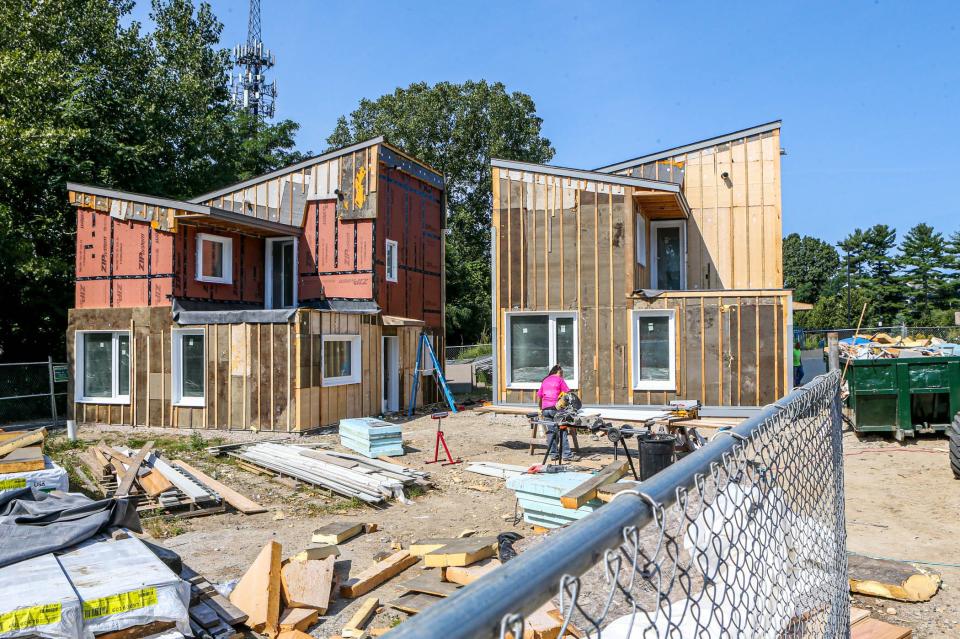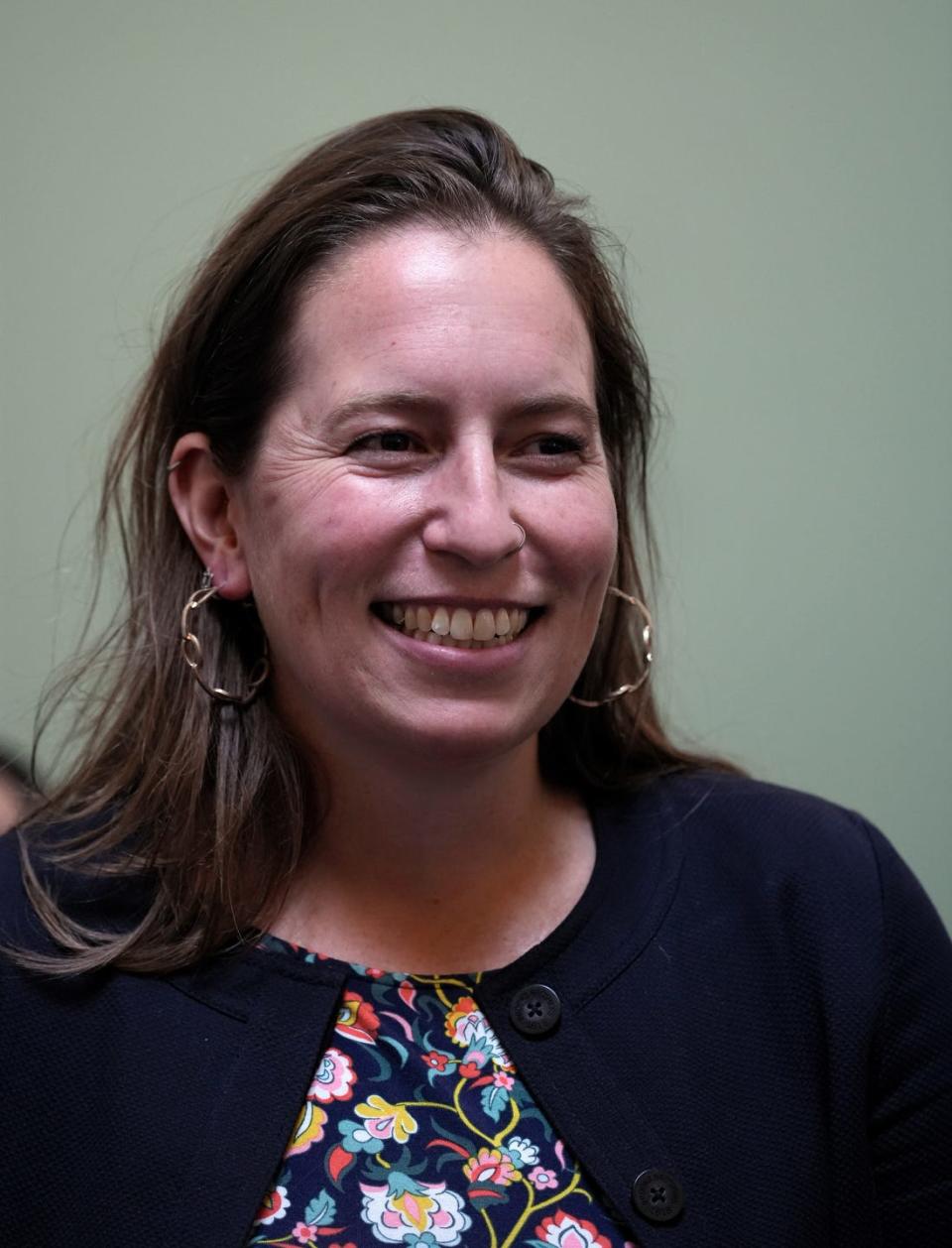RI could be the first state to tackle the housing crisis by acting as a developer
- Oops!Something went wrong.Please try again later.
More than 30 years ago, Rhode Island passed a law requiring 10% of the housing supply in each city and town be "affordable."
Decades later, only six communities have hit that benchmark.
Sen. Meghan Kallman, D-Pawtucket, sees it as a clear sign that something needs to change.
Legislation that she introduced on Friday — S2939, nicknamed the "Create Homes Act" — would use $300 million in American Recovery Plan Act funds to create a centralized, statewide Department of Housing.

It would also allow the state to take matters into its own hands by buying land and building housing — in other words, by acting as a developer.
"No state anywhere is doing that," said Paul Williams, the founder and director of the Center for Public Enterprise, who praised the "unique and bold" approach to addressing the housing crisis.
Major proponents of the bill include Reclaim RI, a group formed by some of the local leaders of Bernie Sanders’ 2020 presidential campaign, but it also has support from more centrist and conservative Democrats.

Notably, co-sponsors include Senate President Dominick J. Ruggerio — a sign that, unlike some proposals to address the housing crisis that have been introduced this year, this one actually has a chance of becoming law.
Kallman, the vice chair of the Senate Housing and Municipal Government Committee, describes it as a "building block," intended to ensure that the state can actually meet its ambitious housing goals.
"We have a lot of energy," she said. "We really need some government infrastructure that can really put some muscle behind those visions."
Housing developments would be open to middle-income workers like nurses and teachers
The "Create Homes Act" would allow the state of Rhode Island to own and manage affordable housing — an idea that might seem like a throwback to the days when the federal government built massive public housing projects.
In some senses, it is. But new housing developments built by the state wouldn't be exclusively for people living in dire poverty, contrary to the stereotype. They would include "workforce housing" for middle-class professionals like teachers and nurses who find themselves priced out of the current market. And a certain percentage of the units could be rented or sold at market rates.
That's the model that's used in Vienna, Austria, where it's common for affluent residents to live alongside middle-class families and low-income workers in attractive, well-maintained "social housing."
In fact, it's not too different from the way that public housing in the United States originally worked, Williams said. Then, in the 1930s, landlords and real estate interests decided that they didn't want to compete with the government for tenants, and successfully made the case that public housing should be reserved for the poorest of the poor.
Shelters: Advocates blast McKee for not moving faster on housing crisis, expiring shelter beds
Housing crisis: State launches landlord incentive program to combat homelessness
In the ensuing decades, public housing came to carry a stigma. Amid chronic underfunding, buildings fell into disrepair. Finally, in the 1990s, the Clinton administration ushered in a slew of policy changes that essentially made it impossible to build more public housing.
Since then, creating affordable housing has typically required turning to nonprofits, which can only do so much with their limited budgets, and private developers, who typically require subsidies and tax incentives.
Williams sees room for states and other local government entities to step in and act as what he calls "public developers." He's aware of one place where that's currently happening: Montgomery County, Maryland, a suburb of Washington, D.C., that has a population about the size of Rhode Island's.
Similar legislation has been introduced in states including California and Hawaii, Williams said. Though he held workshops and presentations for Reclaim members to discuss what a successful "public developer" model would look like, he said, he didn't play a role in drafting the "Create Housing Act."
"The impression I get is that this bill has a pretty good shot of passing, because it has some stamps of approval," he said. "That was not the case in any of these other states."
Political Scene: RI housing chief sees himself as more moderator than 'czar'
Housing crisis is crippling Block Island: Is this the future for the rest of RI?
How would the state go about building affordable housing?
The way that the "public developer" model would work in Rhode Island is outlined over the course of the 40-page bill.
First: The state would be able to create a land bank by acquiring "unimproved land" or properties that are "tax delinquent, tax foreclosed, subject to municipal receivership, vacant or abandoned."
Towns, cities, nonprofits, and quasi-public entities could also sell or transfer land to the state.
All public bodies in the state would be required to review all the real estate that they own by the end of 2022 and determine which assets "are not under current use or planned use." If they own any land that they don't have plans to use within the next 10 years, then they could be required "to enter into a negotiation with the department for the transfer of the parcel to the land bank." (There is a lengthy list of exceptions.)
Next, the housing department could hire its own contractors and oversee the development of new units, or it could "solicit applications from businesses, not-for-profit entities and developers."
The goal, Kallman said, is to identify vacant or abandoned property and "effectively get it into the pool for the construction of housing."
She cited a recent incident when a former group home went up for sale, but none of the nonprofits that wanted to convert it into affordable housing were able to raise the money in time. That's exactly where the state could step in, she said.
More: RI's government will make $3.6 million selling group homes. Homeless advocates are fuming
Creating affordable rentals will likely be a priority, Kallman said, "but there could also be homeownership programs within that, too."
Depending on the size of the development, anywhere from 25% to 50% of the units would need to be designated "affordable," while anywhere from 50% to 75% would be either "affordable" or "workforce eligible."
"Affordable," in this context, means that buyers would need to earn 120% or less of the area median income. In Providence, and the majority of Rhode Island towns, that translates to $72,650 or less for a one-person household. "Workforce eligible" involves more complicated calculation outlined in federal law, but is broadly designed to cover middle-income workers.
The remaining housing units would be sold at market rates,
Why have the state get involved in creating market-rate housing at all? With so much competition for housing, "having more market rate housing creates more affordable housing," Kallman said.
Plus, if a developer needed to put in 10% of market-rate units in order for a project to be financially viable, "we want to have the flexibility in the law to help them do that"
And, broadly, the "best practices" for building housing involve bringing together a mix of different income levels so that people don't end up segregated, she said.
Once a housing development is completed, the state could theoretically allow a nonprofit or private developer to take it over. However, deed restrictions would mean that income limits would stay in place.
A 'carrot and stick' approach to towns
The $300 million in ARPA funding is intended to allow the Department of Housing to get off the ground and get fully staffed.
The bill doesn't address what happens once that funding is exhausted. Kallman noted that the legislature created a transfer tax on high-end real estate last year that now serves a permanent funding stream for affordable housing, and said that she would also like to see a revolving fund set up in future.
"Realistically, money would have to come from a few different sources," she said.
Kallman sees the department serving as a centralized resource for every community in the state that could facilitate projects and help with things like navigating zoning regulations and identifying funding sources.
The "Create Homes Act" would also offer additional education funding to towns that approve affordable housing projects. (The sooner the projects are approved, the higher the bonuses.)
That's because cities and towns are sometimes hesitant that too much affordable housing on their tax rolls will mean losing out on property taxes and having less money for schools, Kallman said. "This is a way to essentially accommodate that, and make up for any difference that may exist," she said.
On the other hand, if cities and towns don't reach the 10% benchmark by July 2026, then affordable housing developments "shall not need approval of the municipality, notwithstanding any municipal law or other statute to the contrary," the bill states. They would solely require approval from the Department of Housing.
"We need to have a carrot and stick," Kallman said. "If you don’t do it, then we’re going to move in in a different way and participate more actively."
The bill is co-sponsored by Sens. Ryan Pearson, Frank Lombardo, Louis DiPalma, Melissa Murray, and Dawn Euer.
In a news release issued by Reclaim RI, Brenda Clement, the director of HousingWorks RI, praised the bill and said that it "would give the state government resources needed to address long-standing housing issues."
"The Create Homes Act is a good first step to address the urgent housing needs that we face," she said.
This article originally appeared on The Providence Journal: RI housing crisis: State could start building its own affordable units

